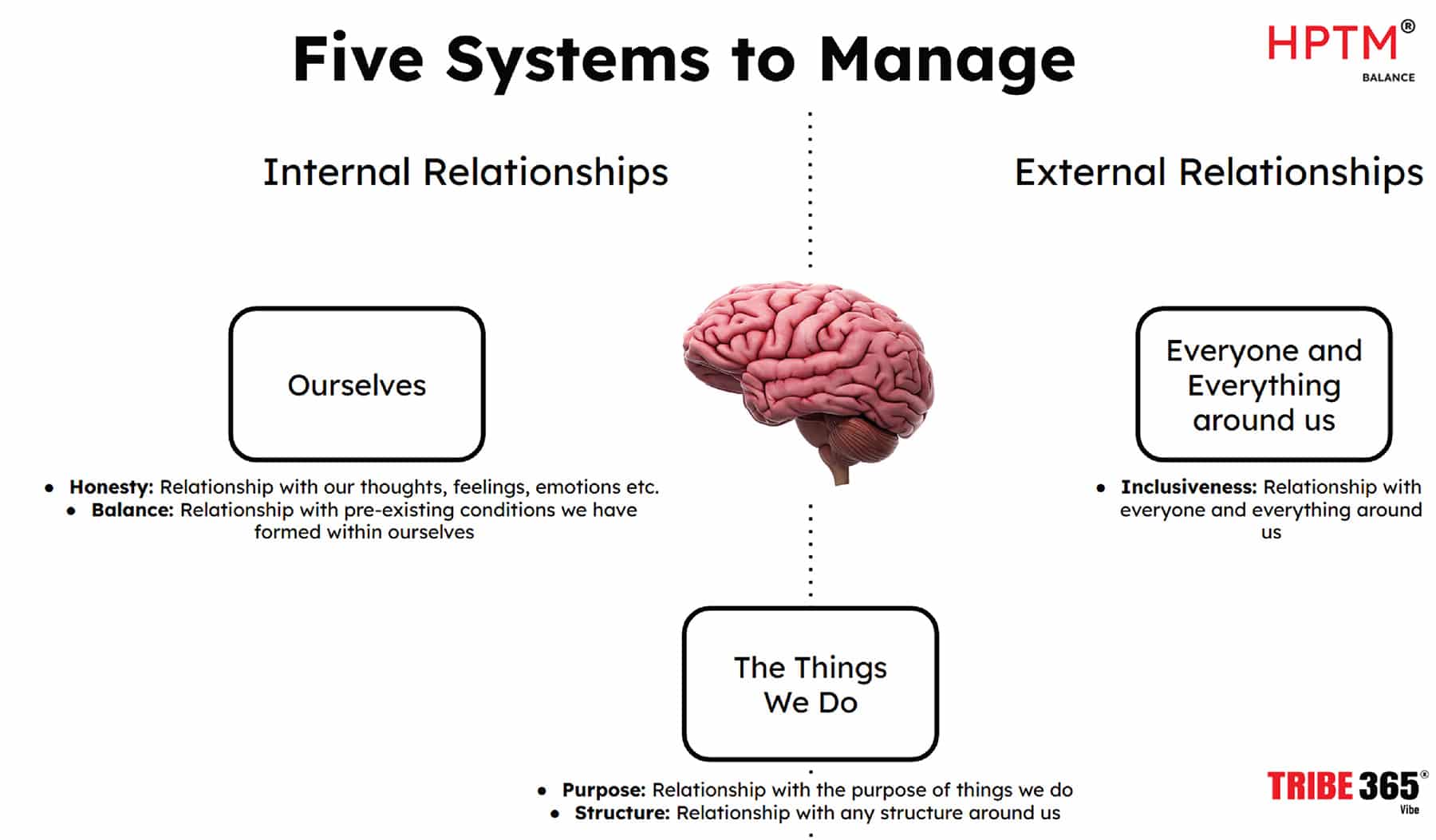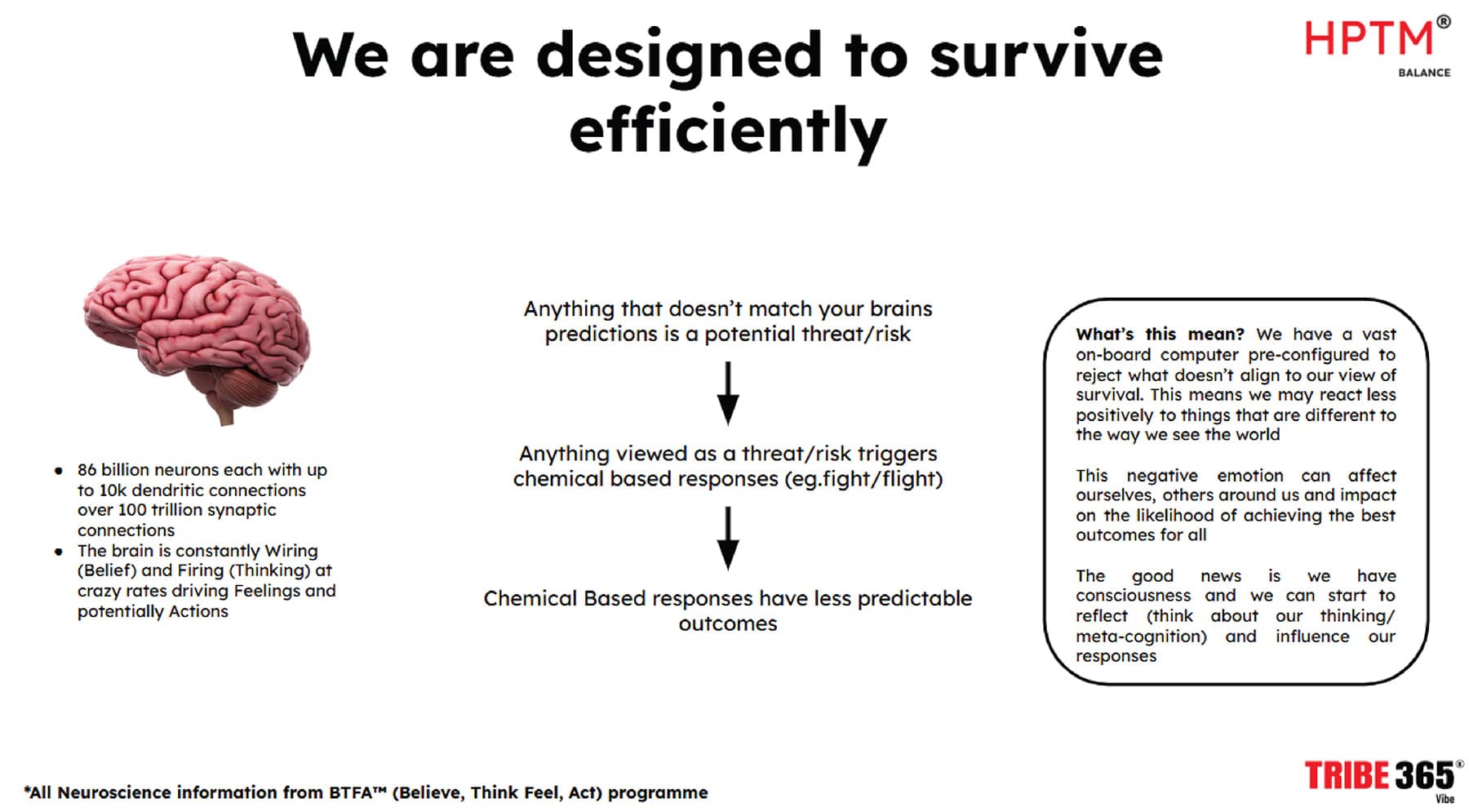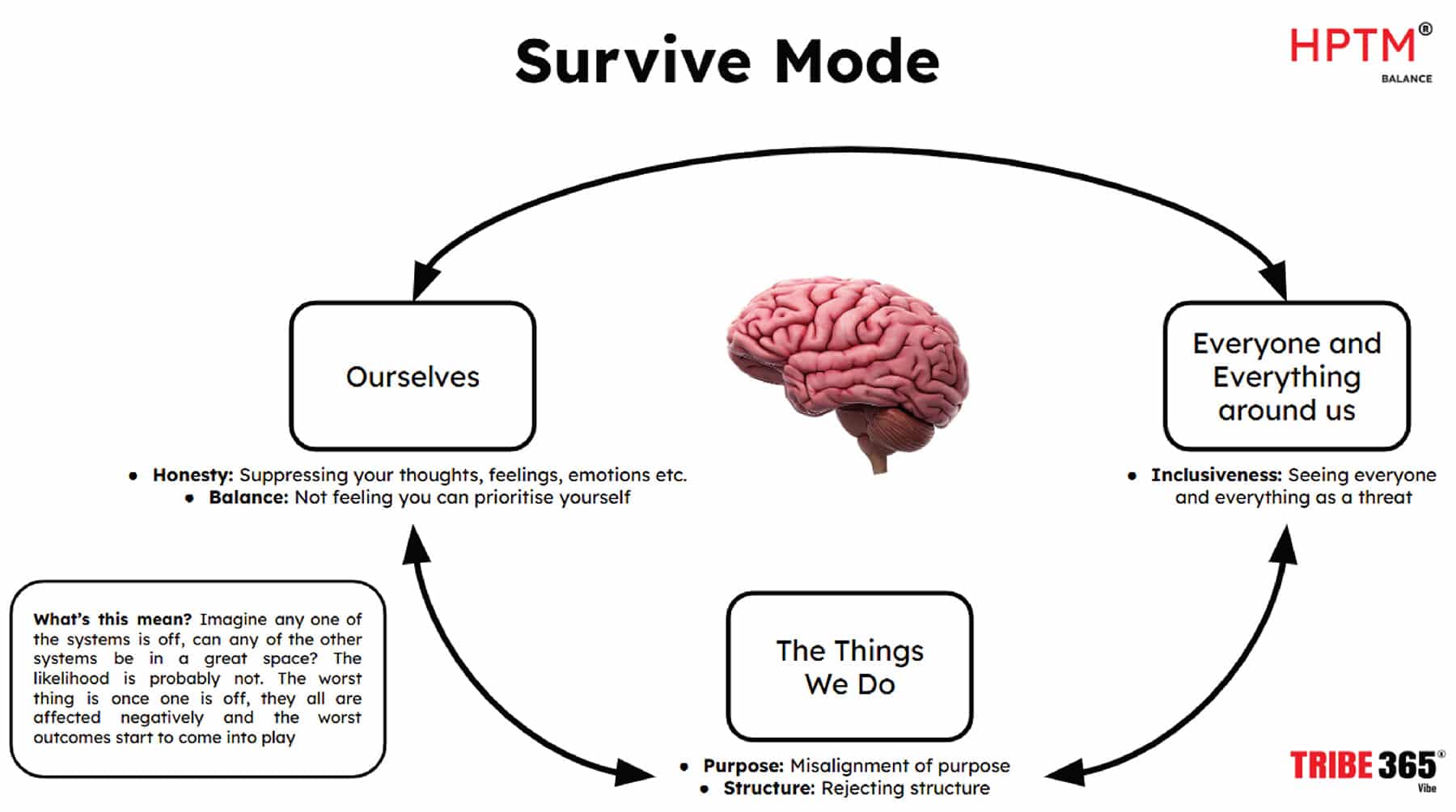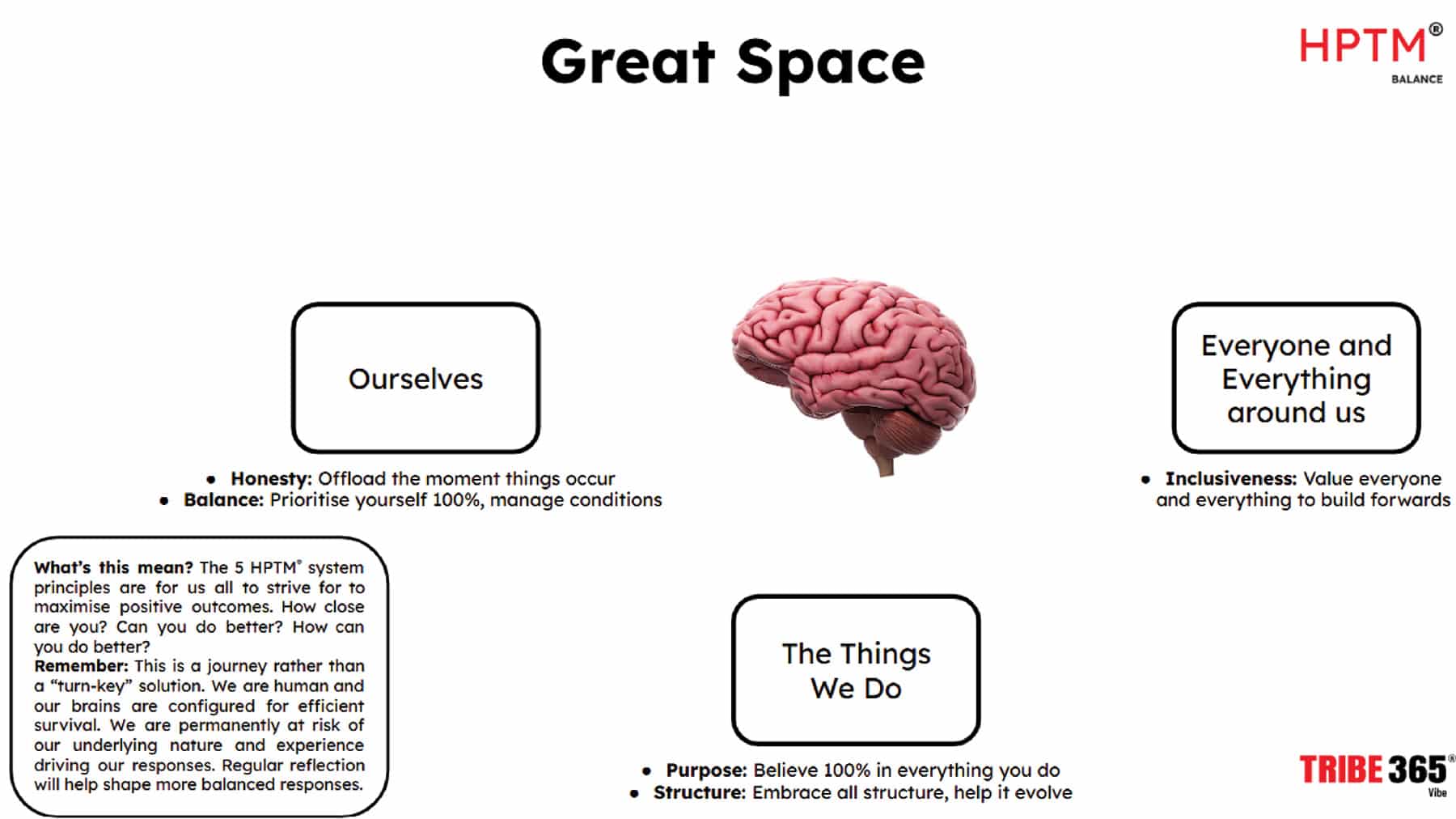Our 5 Autonomous Systems – HI-PB’S
We have 5 autonomous systems (HI-PB’S) within us to manage to assure maximum positive application and likelihood of the best outcomes.
If left unmanaged the systems can work against us and at the very least you will start to feel less positive about things and at worst lead to the very worst outcomes we see within society (violence, hatred, shame etc.)
What are the 5 Autonomous Systems?
The five autonomous systems are identified conscious mechanisms we have within ourselves. As individuals we have total control of our 5 autonomous systems.
The 5 autonomous systems (HI-PB’S) have been defined within the HPTM® (High Performing Team Members) programme as:
- Honesty: Our relationship with our thoughts, feelings, emotions etc.
- Inclusiveness: Our relationship with everyone and everything around us
- Purpose: Our relationship with the purpose of the things we do
- Balance: Our relationship with pre-existing conditions we have formed within ourselves
- Structure: Our relationship with any structure around us
The 5 systems, Honesty, Inclusiveness, Purpose, Balance and Structure, form the acronym: HI-PB’S.
Where did the 5 Autonomous Systems (HI-PB’S) come from?
The 5 autonomous systems (HI-PB’S) were first identified by Tribe365®, a behaviours, leadership and culture consultancy, within their HPTM® culture, leadership and behaviour programme and framework. The first listing of the full 5 HPTM® systems was in 2021. Through the collaboration with Duxinaroe, neuroscientists and creators of BTFA™, it became clear there was a link to supporting the best environments for brains to perform became clear in 2024. The diagram shows the core relationships our brain has (with ourselves, the things we do and everyone and everything around us) and the systems we need to manage to optimise our interaction:

Why are the 5 Autonomous Systems (HI-PB’S) important?
Our brain is our most incredible organ, but it is built for efficient survival.
This means that underneath everything the overriding mission in each of our brains is efficient survival. With the abundance of influences we have in our world and the proximity of information through the internet there is little ability to predict or support what “efficient survival” looks like in any one of the over 8 billion brains in our world.
However, the most important activity any of us can do to influence the alignment of our brain is to reflect. This is called meta-cognition. Thinking about our thinking allows us to influence the wiring of our brain. This allows us to remap potential triggers and position ourselves to explore everything ahead of us instead of dismissing anything through our default “efficient survival”.
By having awareness of the 5 autonomous systems (HI-PB’S) we can start to manage our own individual journey through life and build a mental strength to persevere through the complexity of distraction and influence in everything we do. The 5 autonomous systems (HI-PB’S) bring a strong framework that transcends individuals, teams and organisations and provides a consistency of language and focus allowing us all to adjust where needed and bring “best possible” to everything we do.

What happens if we don’t manage the 5 Autonomous Systems (HI-PB’S)?
If we don’t consciously manage the 5 autonomous systems (HI-PB’S) then we are leaving our brain to default configuration – which is “efficient survival”. We have to remember our brains are the same organs our predecessors (cave people) had to make sure all threats were managed to ensure survival all of the time. The survival mechanism of “things that are different to the way I see a safe world” plays a huge part in our default setting. Unless we actively shape a more positive approach we can find so much that conflicts with our view of the world and lead to a lot of our actions being dictated by our emotions and lead to potentially the worst outcomes for everyone
The risks of non-management of each of the autonomous systems (HI-PB’S) are as follows
Honesty: If we don’t explore our thoughts, feelings, emotions etc. they will build up and create more potential trigger points for fight/flight responses that can’t be managed as we haven’t understood them.
Inclusiveness: If we don’t deliberately position everyone and everything in a positive light there will be more potential for conflict. The conflict will be an internal feeling of not wanting to be around people and externally in resulting behaviour.
Purpose: If we don’t understand the purpose of things the potential for misalignment and conflict is increased.
Balance: If we don’t prioritise ourselves and manage our conditions, the potential for internal conflict though a feeling of injustice and later external in behavioural conflict is greatly enhanced.
Structure: If we don’t practice embracing structure as a default and engaging accordingly then we increase the likelihood of conflict, both internal and external. We and our world is full of structures positioned for as positive a progression as possible. It is always questionable as to who the structure serves, however we cannot disengage first and help evolve second – this is impossible. The only way is to engage and support an improved shape in future.
This could impact others negatively and/or not be optimal for the pursuit of positive benefits for our environments. The brain by default will not be prioritising others or our impact on our environment, it will be shaping a view of “efficient survival”.

How do I manage the 5 Autonomous Systems?
Reflection. There are 5 autonomous system (HI-PB’S) principles (taken from the HPTM® programme) to strive for and these are:
- Honesty: Offload the moment things occur
- Inclusiveness: Value everyone and everything to build forwards
- Purpose: Believe 100% in everything you do
- Balance: Prioritise yourself 100%, manage your conditions
- Structure: Embrace all structure, help it evolve
Synchronise and maximise each one of the systems for maximum mental strength and positive outcomes. They must all be considered equally in everything you do for best results. Any one of them being off puts everything at risk, the key is balance!
Remember – you are still human. Your brain will pull towards “efficient survival” based on everything experienced and inherited. To make sure logic prevails and best outcomes we must always manage our emotions rather than allowing them to manage us. However, we are human, and we should all love that fact, work with this gently and expect the journey to take years as opposed to days/weeks/months.

Summary
People in great spaces can do great things – people not in great spaces are far less likely
Our world and the volume of information we each need to be able to process is increasing and with this our ability as individuals to start rationalising and prioritising where we focus is paramount to how we feel and perform in society. The 5 autonomous systems (HI-PB’S) bring structure to the way we reflect on the relationships our brains have and allows us to simplify the activity of reflection into critical components HI-PB’S (Honesty, Inclusiveness, Purpose, Balance, Structure) that run throughout individuals, teams and organisations, and if optimised creates a runway to growth and performance.
It is a life journey and the closer we come to maximising each one of these systems the better we will be at maintaining maximum mental strength and delivering the best possible outcomes with everything available to us.

Interested in finding out more?
Book a meeting in with the Tribe team
today on +44 (0) 1325734847 or at
team@tribe365.co













